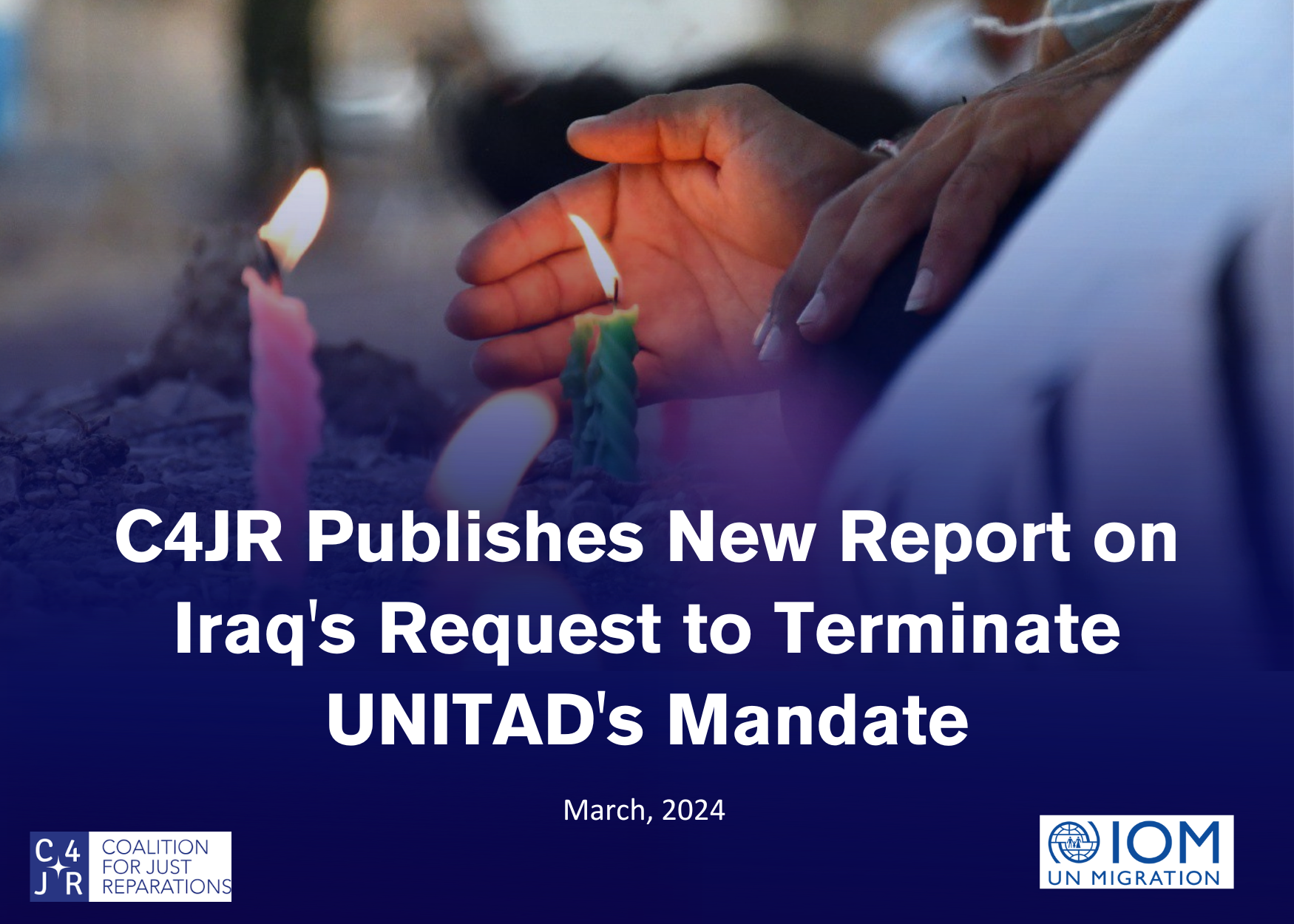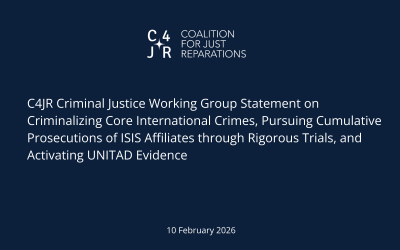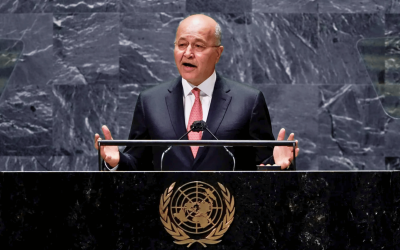BAGHDAD/LONDON — The Coalition for Just Reparations (C4JR), an alliance of Iraqi NGOs calling for comprehensive reparations for survivors of atrocity crimes perpetrated during the ISIL conflict in Iraq, today releases its latest report, “Iraqi Civil Society and Survivor Networks Position on the Request of Iraq to Terminate UNITAD’s Mandate in September 2024.” Based on consultations with survivors as a result of the support of IOM Iraq, this comprehensive document outlines the concerns and recommendations of Iraqi and civil society organizations and survivor networks regarding Iraq’s recent request to the UN Security Council (UNSC) to not renew the mandate of the Investigative Team to Promote Accountability for Crimes Committed by Da’esh/ISIL (UNITAD) after September 2024.
Expressing deep concern over the potential consequences of prematurely closing UNITAD, C4JR emphasizes the critical importance of justice and accountability for victims and affected communities. Survivor networks, in particular, fear that the absence of UNITAD will jeopardize efforts to hold ISIL members accountable for their atrocities.
After urgently coming together to consider the implications of the premature closing of UNITAD and consulting with survivor networks, C4JR has conveyed our views to UNITAD and the UN Secretary-General, who had been tasked (UNSC resolution 2697/2023) with preparing a report on the sharing of evidence collected by UNITAD. We were pleased to see many of our concerns reflected in that report.
Today, in advance of UNITAD’s anticipated road-map report, we publish our concerns in full.
The full report can be downloaded in English here, and in Arabic here.
Please find a summary document of the report in English here, and in Arabic here.
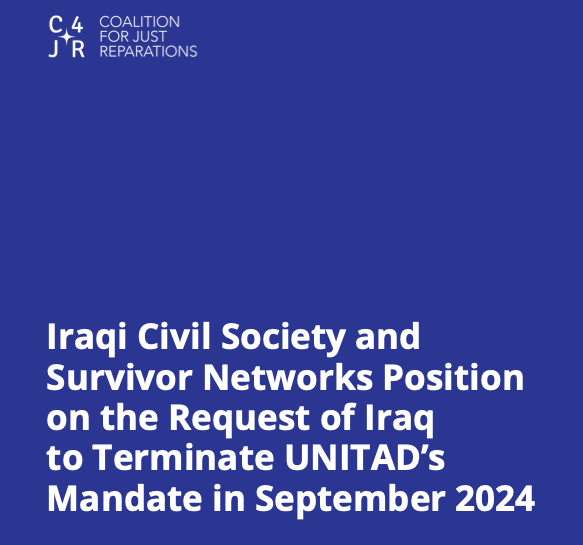
The report identifies six key concerns raised by civil society organizations and survivor networks:
1. Raised expectations among survivors and Iraqi civil society organizations regarding UNITAD‘s establishment and its role in achieving justice.
2. Iraq’s lack of readiness to prosecute core international crimes for which UNITAD collected evidence.
3. Iraq has yet to comply with international law and UN principles, and UNITAD may not be able to hand over much of the evidence it has collected.
4. UNITAD has not completed its work, including structured investigations, building a roadmap for using collected evidence, and finalizing excavation of mass graves.
5. Preventing evidence sharing with third states will hinder the only justice avenue currently available to survivors.
6. Specific concerns about the confidentiality and sharing of evidence with Iraqi authorities.
In light of these concerns, C4JR presents the following recommendations:
1. Establish benchmarks for Iraq’s readiness to prosecute international crimes before closing UNITAD.
2. Implement clear conditions for handing over evidence to Iraqi authorities, ensuring compliance with international law and safeguarding against misuse.
3. Develop a legal framework for evidence sharing with third states or international courts.
4. Create a residual mechanism within the UN system to preserve all evidence collected by UNITAD.
5. Ensure that UNITAD‘s evidence benefits survivors beyond criminal proceedings, such as supporting reparations and truth-telling initiatives.
C4JR urges the Iraqi government, UNITAD, and the UN to address these recommendations to uphold the rights of survivors and promote accountability for ISIL’s crimes.
Expressing apprehension at Iraq’s decision not to renew UNITAD‘s mandate, the report highlights the potential consequences of prematurely closing down UNITAD. Survivor networks, in particular, fear that the absence of UNITAD will jeopardize the pursuit of justice for atrocities committed by ISIL members. As one female Yazidi survivor of ISIL captivity reacted to the news of UNITAD‘s mandate ending, “Once UNITAD is out of Iraq, will ISIL members be held accountable? The presence of UNITAD gave us, the victims and families of victims, hope. However, the Iraqi government is now ending this hope. We have no trust whatsoever in the Iraqi government to continue this process by itself.”[1]
“By collecting, preserving and storing evidence of ISIL´s atrocities in Iraq, UNITAD made justice possible, but only putting to use collected evidence in a fair and victim-centered process will make forthcoming trials justice,” says Dr. Bojan Gavrilovic, Head of Program for Rights and Justice at the Jiyan Foundation for Human Rights. “Survivors strongly prefer such justice being served in Iraq, because they are Iraqis, because atrocities against them, their families and communities took place in Iraq, because many of the perpetrators are their fellow countryman and because they want to witness justice first hand, in their native language. We should listen to them.”
“We look forward seeing the UNITAD-led completion roadmap due on 15 March 2024. This document will be crucial in the discussions on the future of UNITAD’s legacy in the next six months,” says Natia Navrouzov, Executive Director at Yazda, an NGO who has been leading efforts on criminal accountability since 2014. “From now and until the next UNSC resolution on UNITAD’s mandate is voted in September 2024, it is crucial that UNITAD and members of the UNSC engage with Iraqi civil society, including survivors on what is the way forward in terms of accountability for ISIL crimes in Iraq and globally. In my consultations with survivors, they made crucial points and showed a lot of frustration for not being involved meaningfully in these conversations which are related to them, their families and communities. Excluding them means that we have lost sight of why and for who we are even doing this work on justice.”
Find C4JR’s new website dedicated to promoting the need for a survivor friendly criminal accountability mechanism in Iraq, meeting international standards with jurisdiction over international crimes committed by ISIL here.
Stay tuned for further details about an online discussion with key authors of the report and members of the C4JR Criminal Justice Working Group to discuss the C4JR report’s concerns and recommendations in more detail, and to share reflections on the UNITAD road-map report once it has been published in full.
For more information, contact: Alannah Travers: [email protected], or Saber Saeed: [email protected]
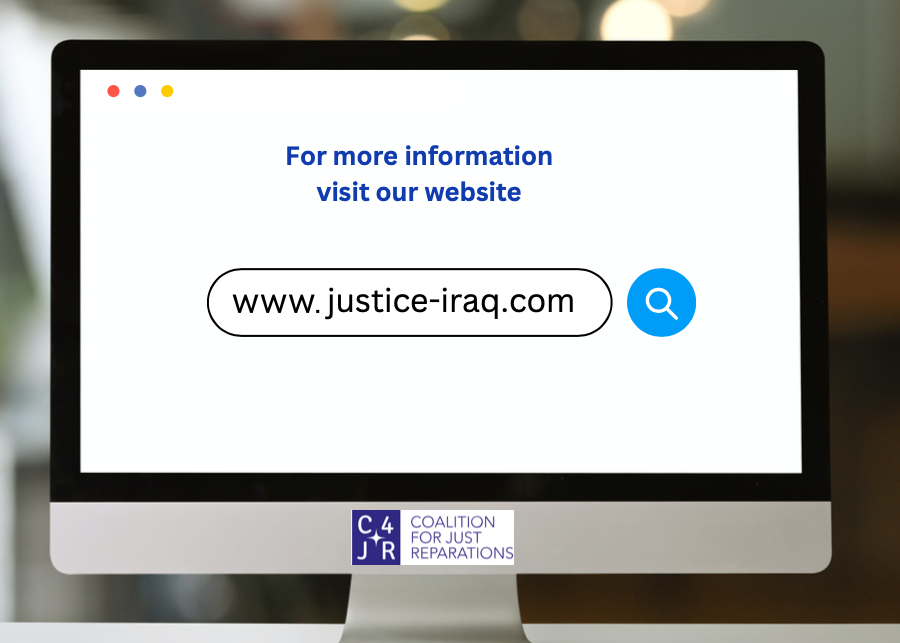
[1] Online consultations conducted with survivors in December 2023.
